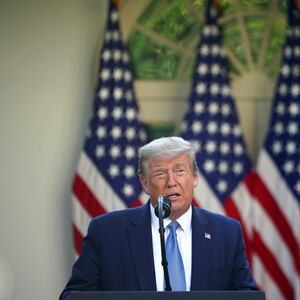Two days after claiming he had “total” authority over governors to order states to reopen, Donald Trump is threatening to adjourn both houses of Congress if they don’t bow before him.
“The current practice of leaving town while conducting phony pro-forma sessions is a dereliction of duty that the American people cannot afford during this crisis,” Trump said during Wednesday’s coronavirus task force briefing, in a move reminiscent of Boris Johnson suspending parliament. He complained that the “phony” sessions, as the House and Senate try to figure out how to meet going forward in a time of social distancing, prevented him from installing more acting officials to posts otherwise requiring senatorial advice and consent. “It is a scam that they do. It's a scam and everybody knows it, and it's been that way for a long time."
When one move to exercise unchecked power is blocked (remember his talk about quarantining New York?), Trump just moves on to another one. This time, he’s taking aim at the power of the Senate itself, and the president is doing so over an almost absurdly low-stakes position.
ADVERTISEMENT
According to Article II, Section 3 of the Constitution, presidents may, "on extraordinary occasions, convene both Houses, or either of them, and in case of disagreement between them, with respect to the time of adjournment, he may adjourn them to such time as he shall think proper."
Regardless of the constitutionality of his claim (for example, the House and Senate do not currently have a “disagreement… with respect to the time of adjournment”), Trump has, once again, found a new way to stress our institutions, upset precedent, and push a maximalist version of his position.
“This is the ultimate example of an untested power,” Jonathan Turley, a constitutional expert who served as an anti-impeachment witness (arguing the constitutional case for Trump’s acquittal), emailed me on Wednesday evening. “It is baffling that the President would take such an unprecedented action for such stated reasons as filling a slot on the Voice of America.”
Indeed, the appointment Trump was most vocal about expediting was the nomination of documentary filmmaker Michael Pack to head the agency that oversees the Voice of America, a government-funded news service designed to spread the values of freedom and democracy around the world.
That’s right. This latest power grab has little to do with fighting the deadly pandemic and everything to do with installing loyalists. While some initially feared Trump would turn Voice of America into a house organ pro-Trump propaganda outlet, the service has maintained its independence and continues to draw the ire of Trump and his team—most recently, when they claimed VOA promoted Chinese propaganda. "If you heard what's coming out of the Voice of America, it's disgusting—what things they say are disgusting toward our country," Trump said on Wednesday.
Regardless of his motives, Trump’s latest threat illustrates how, in a crisis, an executive can unilaterally act (or threaten to act) while everyone else has to react.
“Even if successful, these appointees would serve under a considerable [amount] of controversy.” said Turley, who previously testified that President Obama's recess appointment of Richard Cordray was unconstitutional.
Facing a global pandemic where he was caught flat-footed, does Trump really need to invent a new crisis?
“There are a host of potential challenges here including whether there is truly a disagreement between the houses as members work remotely through a pandemic,” Turley said.
Trump’s complaint now is that the Senate has moved into pro forma sessions to avoid technically adjourning during a pandemic crisis (thus preventing any recess appointments). Article One of the Constitution says that "neither House, during the session of Congress, shall, without the consent of the other, adjourn for more than three days." When the same thing happened a couple years ago, a spokesman for Majority Leader Mitch McConnell explained that "to meet our constitutional requirement of meeting every few days, we’re doing pro formas. We didn’t do it to block Trump.”
Regardless, it’s not clear if McConnell, who has spearheaded the confirmation of numerous conservative judicial appointments, (really) wants all of these Trump lingering appointments approved, or whether he has tacitly approved of some of the stonewalling. But he would have to buy in to Trump’s plan for this to work. In order to force this gambit, “Trump would need to get the Senate to adjourn to trigger a disagreement with the House,” Turley says. “Such a disagreement would then trigger his Article II authority which is needed to create a basis for a recess appointment.”
Does McConnell want his legacy to be as the Majority Leader who presided over the erosion of the Senate’s independence and the separation of powers? In a sense, allowing Trump to adjourn Congress would be the logical conclusion after allowing him to declare a bogus “emergency” to bypass Congress’ power-of-the-purse authority and fund construction of a border wall with Mexico.
“As usual, the President is playing poker with his cards facing outward,” Turley says. “This will test Republican members and their fealty to their own institution. This is as unprecedented as it is unnecessary.”







